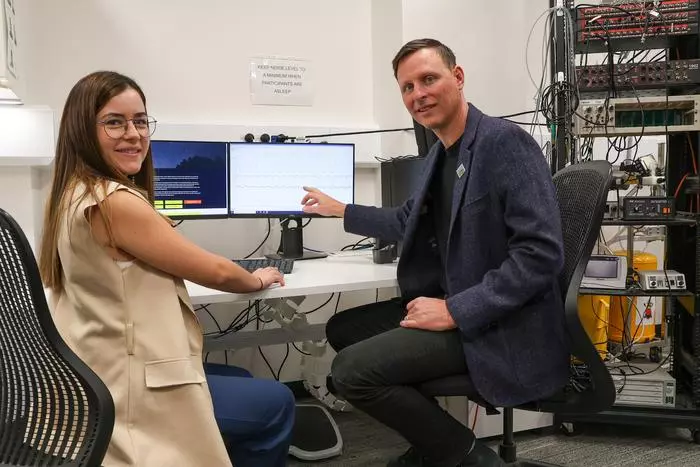A huge new international study has uncovered, for the first time, a weekly rhythm disturbance in one of the world’s most common but under-diagnosed sleep disorders – and it’s not good news for your Saturday night. Researchers have coined the term “social apnea” to describe the consistent and significant rise in obstructive sleep apnea (OSA) severity that occurs during the weekend, likely driven by late nights, alcohol, smoking, sleeping in and other shifts in routine.
Flinders University researchers looked at sleep data from 70,052 people – predominantly middle-aged men (81%, average age 53 years) – across 23 countries, each tracked for an average of almost 500 nights using a validated under-mattress sensor. The researchers didn't just monitor people with an existing OSA diagnosis; instead, they analyzed nightly breathing data, using the same severity cut-offs as clinical labs. From this, the scientists could see who met the criteria for mild, moderate, or severe OSA on any given night – whether or not they’d been formally diagnosed.
What they found was that there was a large discrepancy in weekday and weekend OSA disturbances. On Saturdays, in particular, participants were 18% more likely to have moderate-to-severe OSA compared to, say Wednesday or Thursday. The effect was stronger among men (21% higher risk) compared to women (9%), and younger adults under 60 years (24% higher) compared to older adults aged 60 years and above (7%).
In addition to this, people who slept in for 45 minutes or more on weekends, compared to weekday mornings, had an even steeper increase – a 47% higher chance of more severe OSA.
“Sleep apnea is already a major public health issue, but our findings suggest its true impact may be underestimated,” says lead author and Dr Lucia Pinilla, from FHMRI Sleep Health, Flinders University. “Most clinical diagnostic testing is done on a single night, typically a weeknight, missing the weekend effect we’re now calling social apnea.”

Social apnea – as the name suggests – is the sleep that bookends days with more social activities and sleep schedules are out of whack. The researchers don't yet know the precise mechanisms behind this alarming spike in OSA severity, but say a change in behaviors such as staying up late or sleeping in, plus alcohol intake, looks be the key driver.
“We don’t yet know exactly why, but alcohol use, lighter sleep, and less consistent use of OSA therapies likely play a role," said Professor Danny Eckert, Director of FHMRI Sleep Health and senior author.
Because most formal sleep studies are conducted midweek, the weekend spike revealed by this research could mean many cases are being missed or underestimated. Someone with mild OSA on a Wednesday might have moderate or severe OSA on a Saturday – but unless they’re tested on both nights, that difference remains invisible to doctors.
Eckert said their novel "social apnea" findings highlight the importance of more comprehensive sleep studies that take into account weekend variabilities – and for people with OSA to be aware how their days "off the clock" could be dramatically increasing their health risk.
“Relying on a single-night sleep study may miss important variations, leading to underdiagnosis or misclassification of OSA severity,” he said, suggesting that people should do their best to maintain a sleep routine and be aware of the added weekend risks. “Try to keep the same sleep schedule throughout the week and weekend, ensuring that you get the recommended seven-to-nine hours of sleep a night.
“Keeping a fixed wake-up time and using your prescribed OSA therapy, even on weekends, and going to bed when you feel sleepy will help ensure you frequently get enough restorative sleep which can help combat the weekend spike in OSA," he added.
In separate but related research, a Flinders University team – led by Bastien Lechat, who was also involved in the social apnea study – found that, in this same dataset of more than 70,000 people, different seasons also impacted OSA severity.
Lechat had previous led a study identifying how global warming is likely to increase OSA cases by 45% worldwide.
“OSA tends to be worse during summer and winter, with severity increasing by 8-19% compared to spring and autumn,” he said of his latest research uncovering seasonal risk variability. “This seasonal spike is partly explained by higher temperatures, which disrupt sleep and lead to lighter sleep stages which is associated with worse OSA. In winter, longer sleep and later wake-up times increase time spent in REM sleep, which is also linked to more frequent apnea events.”
This additional work also supports the need for broader sleep studies rather than just those that grab a snapshot, in assessing OSA – a condition that affects an estimated billion people around the world. If untreated, OSA increases the risk of developing heart disease, diabetes, cognitive decline and depression, and can be fatal.
The social apnea study was published in The American Journal of Respiratory and Critical Care Medicine.
Source: Flinders University via EurekAlert!





